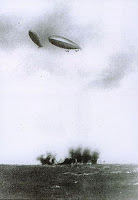100 years ago today, the 29th September 1911, Libya was again a battleground. The Italo-Turkish War, known as the Guerra de Libia (Libyan War), it was fought between the Ottoman Empire and the Kingdom of Italy from 29th September 1911 to the 18th October 1912.. At the end of the conflict, Italy was awarded the Ottoman provinces of Tripolitania, Fezzan and Cyrenaica, which together formed the territory that has become known as Libya.
 Apparently, the war produced numerous technological advances, notably the use of aeroplanes. On the 23rd October 1911, an Italian pilot, Captain Carlo Piazza, flew over Turkish lines on the world’s first aerial reconnaissance mission, and on the 1st November 19112, the first ever aerial bomb was dropped by Sottotenente Giulio Gavotti, on Turkish troops in Libya, from an early model Etrich Taube aircraft.
Apparently, the war produced numerous technological advances, notably the use of aeroplanes. On the 23rd October 1911, an Italian pilot, Captain Carlo Piazza, flew over Turkish lines on the world’s first aerial reconnaissance mission, and on the 1st November 19112, the first ever aerial bomb was dropped by Sottotenente Giulio Gavotti, on Turkish troops in Libya, from an early model Etrich Taube aircraft. |
| Giulio Gavotti |
 |
| Italian dirigibles bomb Turkish troops |
 |
| Etrich Taube |
The Etrich Taube, was a pre-World War I monoplane aircraft. It was the first mass-produced military plane in Germany. As Imperial Germany's first practical military aircraft, the Taube ("dove") was used for virtually all military aircraft applications, as a fighter, bomber, surveillance aircraft and trainer from 1910 until the start of World War I in August 1914.
 |
| Turkish and Italian delegations at Lausanne. From left to right (seating): Pietro Bertolini, Mehmet Nabi Bey, Guido Fusinato, Rumbeyoglu Fahreddin, & Giuseppe Volpi. |
On October 18, 1912, Italy and the Ottoman Empire signed a treaty in Ouchy near Lausanne (the First Treaty of Lausanne). The main provisions of the treaty, often also called Treaty of Ouchy to distinguish it from the 1923 Treaty of Lausanne, were as follows:
1- The Ottomans will withdraw all military personnel from Trablus and Benghazi vilayets (town councils in Libya) but in return, Italy would return Rhodes and twelve Aegean islands nearby back to the Turks.
2- Trablus and Benghazi vilayets will have special status and a naib (regent) and a kadi (judge) will represent the Caliph.
3- Before the appointment of these kadis and naibs, the Ottomans will consult the Italian Government.
4- The Ottoman government will be responsible for the expenses of these kadis and naibs.
The invasion of Libya was a costly enterprise for Italy. Instead of the 30 million lire a month judged sufficient at its beginning, it reached a cost of 80 million a month for a much longer period than was originally estimated. I have no idea what the relative purchasing power of the Italian Lire was in 1911, but it was clearly considerably higher than it was on the 1st January 1999 when Italy joined the Euro.
And it is now, 100 years on, that the European community is dropping bombs on Libya, and experimenting with the technology of warfare. It is also proving to be a costly exercise. Will all those bombs and weapons have to be replaced? A single mission must run into millions of pounds, amounting, overall to billions of pounds. Is it really something the economies of Europe can afford? I would think it would be far more constructive to assist the trembling economies of some of our European partners, than continuing to drop exploding currency on the Libyan desert.
Why does plus ça change forever spring to mind.

No comments:
Post a Comment